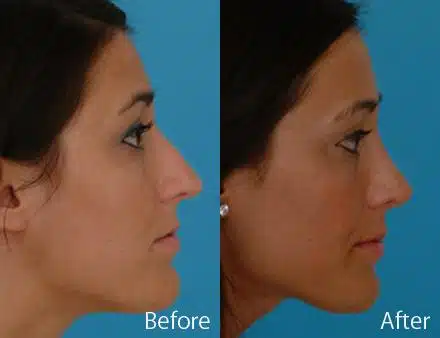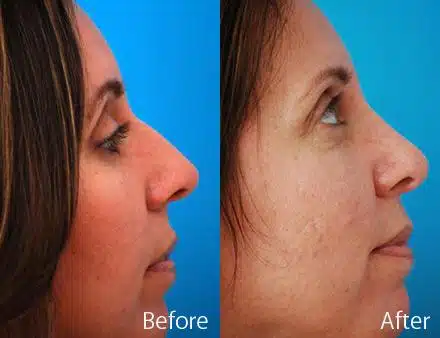Caffeine and Rhinoplasty Recovery: What You Need to Know

Can You Drink Coffee After Rhinoplasty? Patients are advised to avoid drinking coffee for at least six weeks after nose surgery for several reasons. While it may be tempting to reach for that cup of joe in the morning, it is important to understand the potential impact that caffeine can have on your healing process.
After rhinoplasty surgery, your body needs time to heal and recover. Drinking coffee can interfere with this process in a few different ways. First and foremost, caffeine is a stimulant that can increase blood pressure and heart rate. This increased blood flow can lead to swelling and bruising, which are common side effects of rhinoplasty surgery.
In addition, caffeine is a diuretic, meaning that it can dehydrate you by increasing urine production. Dehydration can slow down the healing process and make it more difficult for your body to repair itself after surgery. Proper hydration is crucial for promoting optimal healing and reducing the risk of complications.
Furthermore, many patients experience nausea and stomach upset after undergoing anesthesia during rhinoplasty surgery. Caffeine can exacerbate these symptoms and make you feel even more uncomfortable during your recovery period.
If you are craving a warm beverage in the morning, consider switching to decaffeinated tea or herbal infusions instead. These options will not have the same negative effects on your healing process as coffee does. While it may be difficult to give up your daily cup of coffee temporarily, doing so can greatly benefit your recovery after rhinoplasty surgery.
This article explores the relationship between caffeine and rhinoplasty recovery, providing valuable insights for those considering or recovering from this procedure.
Rhinoplasty Recovery Essentials
The Recovery Process
The recovery process following rhinoplasty surgery is a critical phase that demands careful attention and adherence to post-operative guidelines provided by the surgeon. This period, which can extend up to a year or longer, is characterized by a series of physiological changes as the body heals from the rhinoplasty procedure.

Initial Post-Surgery Care
In the initial days after surgery, patients may experience discomfort post-nose surgery, swelling, and bruising, which typically subside within the first few months. During this recovery period, it’s crucial for patients to rest and sleep with their heads elevated to minimize swelling and promote blood circulation to the healing tissues. This position also helps prevent the collection of blood in the nasal passage, which could lead to complications such as blood clots.
Avoiding strenuous activity is another key aspect of the recovery process. This is because intense physical exertion can cause an elevation in blood pressure, leading to increased swelling and potentially increasing bleeding.
Weeks Following Surgery
In the weeks after surgery, patients should also be mindful of their diet. Conscious meal choices post-rhinoplasty surgery can significantly aid tissue recovery. A balanced rhinoplasty diet rich in fiber, soft fruits, and green vegetables can provide the necessary nutrients for healing. It’s also advisable to avoid a high-sodium diet that can lead to water retention and exacerbate swelling.
Patients should drink plenty of water and avoid hot drinks, as well as diuretic substances like caffeinated beverages after surgery that can prevent dehydration.
Importance of Following the Post-Operative Guidelines
Following the post-operative guidelines is vital to the healing process. These instructions often include dietary restrictions, guidelines on physical activity, and advice on managing swelling and discomfort.
Ignoring these guidelines can result in complications, such as infections or prolonged inflammation, which not only jeopardize the surgical outcomes but can also necessitate additional medical interventions.
In addition, following the post-operative guidelines facilitates a smoother and often quicker transition back to daily activities, ensuring that the long-term aesthetic and functional benefits of the surgery are fully realized.
Understanding Caffeine
Effects of Caffeine on the Body
Caffeine is a well-known stimulant, often consumed through coffee, tea, and energy drinks. It primarily affects the central nervous system, promoting alertness and warding off drowsiness.
However, it also has a significant impact on other body functions. For instance, caffeine can increase heart rate and elevate blood pressure, which could potentially lead to cardiovascular complications.
Caffeine’s influence also extends to metabolic processes, as it can enhance the breakdown of fats, leading to increased fatty acids in the bloodstream.
How Caffeine Interacts with the Healing Process
The healing process after any surgical procedure, including rhinoplasty, requires optimal blood flow to the affected area to deliver nutrients and remove waste products. Caffeine can interfere with this process. Its diuretic properties can lead to dehydration, which slows down healing.
Caffeine causes blood vessels to constrict, reducing blood flow to the healing tissues. This can delay the recovery process and potentially affect the final outcome of the cosmetic surgery.
Secure Your Safe Treatment Experience with Dr. Daniel G. Becker.
Join our satisfied clients who’ve experienced safe, effective treatments.
Caffeine After Rhinoplasty
Adverse Effects of Consuming Caffeine Post-Nose Surgery
Consuming caffeine after rhinoplasty can have several adverse effects:
- It increases blood pressure, potentially exacerbating swelling and delaying the healing process after rhinoplasty.
- Caffeine acts as a diuretic, leading to dehydration that can further impede recovery.
- It stimulates the nervous system, causing restlessness and sleep disturbances that are counterproductive to healing.
Optimal Intake of Fluids Following a Nose Job
Maintaining optimal hydration is crucial during the recovery process post-rhinoplasty. This aids in detoxification, supports the body’s systems, and promotes the healing of surgical wounds. It’s essential to consume plenty of fluids, but avoid caffeinated and alcoholic beverages, which can lead to dehydration and interfere with the healing process.
Recommended Beverages After Rhinoplasty
The recommended beverages after rhinoplasty are primarily water, herbal teas, and other non-caffeinated drinks. These drinks will keep you hydrated without the side effects associated with caffeine. Avoid hot drinks in the first three days following surgery, as they can stimulate the sinuses and potentially cause more nasal mucus buildup and bleeding. Also, steer clear of cold or frozen drinks during the rhinoplasty recovery period.
Restrictions on Eating Habits After Rhinoplasty
Following rhinoplasty surgery, it’s essential to adhere to a balanced diet that supports healing and reduces swelling. This includes consuming soft foods high in fiber and protein while being rich in vitamins and minerals. Foods that can lead to water retention, such as those high in sodium, should be avoided, as they can exacerbate swelling.
Dairy products, which can cause mucus buildup and congestion, should be avoided in the first week after surgery. Also, chewy foods should be avoided, as the action of chewing can put stress on the healing nasal tissues.
So When Can I Drink Coffee After Rhinoplasty?
The question of when one can resume caffeine consumption after rhinoplasty surgery is a common concern for patients. Caffeine, often consumed in the form of a cup of coffee or caffeinated soda, should ideally be avoided for at least a few weeks after nose surgery. Ideally, you should wait for 2 months before consuming caffeine while you recover from your procedure.
This is due to the potential effects of caffeine on the body post-surgery, such as an elevation in blood pressure, an exacerbation of swelling, and a delay in the healing process. Caffeine can cause blood vessels to narrow, restricting blood flow to the healing tissues and potentially leading to a collection of blood or blood clots. It’s also worth noting that caffeine-containing drinks can lead to dehydration after surgery, which is detrimental to the recovery process.
It’s always best to consult with your surgeon for personalized advice based on your individual health and recovery progress.
Consult with a Rhinoplasty Expert
At Becker Rhinoplasty Center, Dr. Daniel G. Becker, a renowned facial plastic surgeon, is available to answer your questions and provide comprehensive advice to ensure a smooth and successful recovery.
If you’re considering rhinoplasty or have any concerns about your recovery process, it’s essential to consult with a rhinoplasty expert. Contact us today by calling one of our clinics at 609-436-5740 (Central New Jersey) or 856-772-1617 (South New Jersey).

